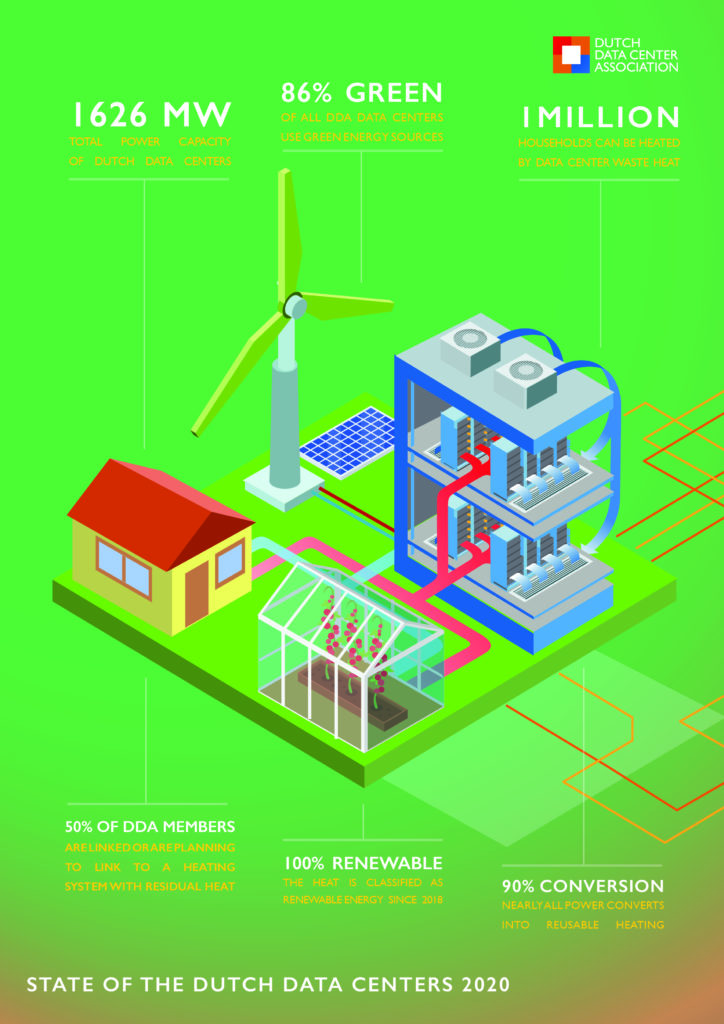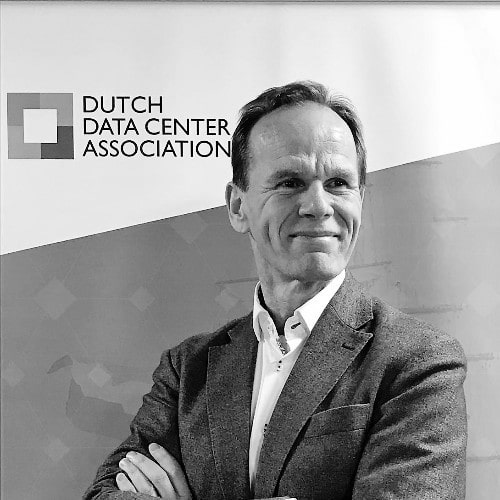In almost every industry sustainability has found its way to the top of the priority list, even more in an industry that is in such high demand of power as the data center market. Both the global Paris Agreement (2015) and our own Climate Agreement (2018) enforce us to act smarter and more responsible with regard to the environment. The data center industry aims to contribute proactively on this matter and thrives to be one of the first industries reaching these goals.
The entire industry is fully electric and aims to run on electricity from sustainable resources. Almost all of this electricity is transformed into residual heat. Several residual heat projects have launched and residual heat of data centers has been classified as ‘renewable energy’. This means that data center residual heat can make a significant contribution to run sustainable district heating systems. Despite the industry’s efforts to move forward on these projects, additional (governmental) support is needed.
The larger the data center, the more energy-efficient it is. By utilizing the latest technologies and innovations, data centers are able to reduce their energy use. Even with the significant growth of the amount of data processing, data centers are able to keep the growth of energy consumption limited. However, data centers concentrate the need for electricity and the electricity networks and substations have never been designed like this. To keep our digital economy going, we must continue to provide our data centers with sustainable electricity.
Data centers in the Netherlands represent a concentration of energy consumption. That consumption is reinforced by the emergence of clusters of data centers, as we now see in Amsterdam. These clusters have a major impact on power networks and substations. After all, these were never designed with an eye on data centers. The speed of the network and regulations are not made to grow with the digital economy. An important objective of the DDA is therefore to continue to provide data centers with electricity. Electricity distribution is highly regulated in the Netherlands. This has ensured that we have one of the best networks in the world. But that also makes it difficult to keep up with the changes in our economy and our energy use. The DDA therefore wants more scope in legislation. Distribution networks must be able to look further ahead and install additional capacity in their cables and substations. The power consumption of data centers is different from regular industries. Data centers are not dependent on the energy grid since they have emergency power. Transfer, which is now strictly impossible, could take place under certain conditions. This would allow us to resolve arrears and upcoming shortages in the expansion of substations
80% of the data centers affiliated with the DDA use electricity from sustainable sources. The tech industry is at the forefront of this. Unfortunately not all green energy comes from the Netherlands. A part is imported from Scandinavia or greened through other certificates. There is insufficient generation of sustainable energy in the Netherlands. The DDA strives for the use of completely green electricity, as close as possible to the consumption point generated.
Data centers produce a lot of heat. That heat is often released to the outside air, and is therefore lost. The DDA is actively initiating and accelerating data center residual heat projects. When we use the residual heat from all those data centers for heating homes, offices and swimming pools, for example, we also save on CO2 emissions. For that reason, the Dutch data center sector decided in 2017 to offer its residual heat to the Dutch government free of charge and since the end of 2018, data center residual heat has been classified as "renewable energy" for the BENG standard. In addition, the DDA organizes the annual congress "Residual Heat & Innovation Data Center". Here, the parties involved share their knowledge to jointly take the next step towards a sustainable, circular economy.
Due to the strong growth of data centers, a growth in power consumption is inevitable. But what we can do is to keep the growth in power consumption as low as possible. The concept of data centers is in itself a way of energy efficiency. By placing more IT in one large data center, energy costs are saved. After all, data centers are much more efficient in their power consumption than small server enclosures. By working on a large scale, data centers can, for example, save on energy costs for cooling and the electricity needed to run all equipment. Data centers also save on their energy consumption by investing in new technologies and efficient equipment, which is not always possible for smaller companies. The DDA therefore supports new techniques in the field of cooling (such as smart and water cooling), heat storage, photonics and new architectural applications that reduce the power consumption of data centers in the long term.


Copyright © 2021 Dutch Data Center Association
Blijf op de hoogte van het laatste datacenter nieuws